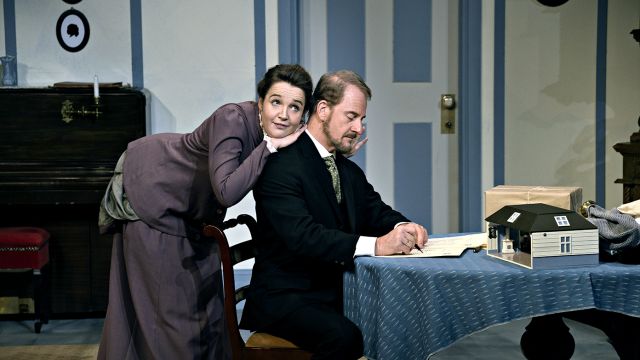A Doll’s House
Aarne Neeme’s direction of this play, written 140 years ago, keeps it relevant, realistic, and easy to relate to as it exposes the potentially catastrophic consequences of both misguided desperate actions and inescapable social strictures.
A synopsis of this play, which includes bitterness, blackmail, and unintentional dehumanisation, may make it appear to be heavy-handed or dark. In the hands of Aarne Neeme, though, the play is relevant, realistic, and easy to relate to.
Torvald and Nora Helmer enjoy a lighthearted, affectionate, but superficial marriage in which Nora has had to keep from Torvald a dark secret concerning actions she took in order to spare her father in his final illness and to save Torvald’s life. And that secret returns to haunt her when she inadvertently makes desperate a man who could betray it.
The play increasingly spotlights the contrast between Nora’s moral choices and Torvald’s own moral values. Ultimately, though, it highlights another discrepancy: between a woman’s full humanity and the roles that social rules and her husband’s limited perception have limited her to. The decision that that discrepancy leads Nora ultimately to take must have shocked audiences in 1879, when Ibsen wrote the play, and even now seems unnecessarily extreme. But the ethical conundra that Torvald; Torvald’s underling Nils Krogstad; Nora’s friend Kristine; and especially Nora herself face are as relevant today as they were when Ibsen penned the play.
Superb costuming, a well-designed set, perfect lighting, and generally beautiful articulation contributed a great deal to the suspension of outer reality. And delightful acting brought immediacy to the play that would be difficult to evoke with a cast overreaching for the dramatic. In particular, Susanna Frith, as Nora, well conveyed the only haltingly expressed internal struggles of a woman who sees her doom approaching despite her best intentions; and Alexandra Pelvin superbly made Kristine’s private thoughts plain by the merest body signals.
In the hands of REP’s talented cast and crew, this iconic play shows neither its age nor its understorey. It is well worth experiencing.
John P. Harvey
Image: Susannah Frith and Robert De Fries, in A Doll's House. Photographer: Ross Gould.
Subscribe to our E-Newsletter, buy our latest print edition or find a Performing Arts book at Book Nook.

